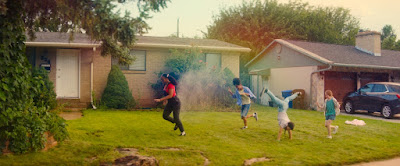 |
| Image courtesy of IFC Films. |
This week's moviegoing theme is seemingly minor works from major artists - namely, George Miller's "Three Thousand Years of Longing" and Claire Denis' "Both Sides of the Blade." In the case of the latter, the film might rank among the great French director's most unusual projects - but only due to its ordinariness when juxtaposed against the often cerebral, unsettling and surreal works that mostly dominate her oeuvre.
For those unfamiliar with Denis' work, the highlights include the masterful "Beau Travail," which is inspired by Melville's "Billy Budd" and features one of the most jaw-dropping endings I've ever seen; the shocking erotic horror film "Trouble Every Day"; the powerful colonialism dramas "White Material" and "Chocolat" (no, not the one with Juliette Binoche); and the warm "35 Shots of Rum." Some of her other works - "L'Intrus" or "Bastards," for example - defy description.
So what makes "Both Sides of the Blade" so unusual is its relative straightforwardness. The picture opens on a shot of a vacationing couple - Sara (Binoche) and Jean (Vincent Lindon, who was incredible in last year's "Titane") - enjoying a swim in the ocean, holding hands as they walk against the tide through the water.
This idyllic scene is short-lived. Upon arriving back in Paris, we learn of how Sara and Jean met. Sara was dating Jean's good friend, Francois (Gregoire Colin), when the two of them met and Jean was married at the time - his son, Marcus (Issa Perica), lives with Jean's mother, and the relationship between father and son seems strained. When Francois turned out to be unreliable, Sara and Jean got together, breaking up his marriage. However, Jean also spent some time in prison for a crime that is never revealed.
Shortly after returning from their vacation, Francois pops back up out of the blue. He and Jean strike up some sort of business partnership that involves recruiting sports players - the details are vague - and some tension arises between Sara and Jean over the optics of the situation. She appears incensed that her previous dalliance with Francois seems to not be the subject of conversation at all between her husband and former lover, while Jean makes it obvious to Sara that he has no interest in broaching the subject.
Meanwhile, Francois and Sara keep a distance from each other as her husband seemingly runs off at any given moment to meet with Francois, that is, when he's not standing on the balcony speaking to him in hushed tones on his cell phone. The film gives off the appearance that something shady might be taking place, but we're never given more insight into the situation.
Not surprisingly, Francois and Sara eventually make contact - and the tension between she and Jean increasingly gets worse. Meanwhile, he keeps trying - and failing - to make contact with Marcus to discuss his absenteeism at school and his penchant for swiping his grandmother's credit card.
Interspersed with all of this are some discussions about race - Marcus's mother is Black, so there's an uncomfortable discussion in which Jean tries to lecture to his son about people not seeing race when they look at people. There are also scenes in which Sara interviews people for the news radio program on which she works about topics of white privilege and racial identity. Although the topics are of interest, they are mostly left hanging between all of the domestic drama.
And that is primarily what "Both Sides of the Blade" is - a domestic drama with a tone that often makes it feel like a thriller. The inevitable breaking point is reached in Sara and Jean's relationship, leading to a series of emotionally brutal arguments near the picture's end - which culminates with a damaged electronic device that could portend not one, but two, unhappy endings.
Denis is a fascinating filmmaker - for the uninitiated, I'd highly recommend "Beau Travail" and "Trouble Every Day," for those who can stomach it - and her filmmaking skills are ever-present in her latest picture, even if the film itself is surprisingly more simplistic than what you'd typically expect from one of her films. It's a well-made melodrama with some strong performances, while at the same time a minor entry into her otherwise eclectic and impressive body of work.





